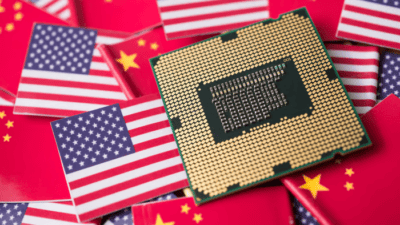This article was originally published on Fool.com. All figures quoted in US dollars unless otherwise stated.
The stock market's recent rout has distracted investors from taking note of some of the big cultural and technological megatrends. But those trends are still underway, translating into opportunities for investors who can look past all the noise.
One compelling megatrend to plug into is the metaverse. It's a market that Bloomberg Intelligence estimates will grow at an average annual pace of 13% through 2024, when it will be worth nearly $800 billion.
Let's take a closer look at three beaten-down names with at least a small stake in the metaverse arena. These small stakes, of course, can evolve into major profit centers as the metaverse market matures.
1. Nvidia
You most likely know Nvidia (NASDAQ: NVDA) as a maker of graphics processors used to connect a computer to a computer screen. The same tech also powers a bunch of artificial intelligence initiatives. But the metaverse? What can this company do to help build the world's virtual meeting places?
It's actually a pretty intuitive fit. A functioning virtual world doesn't just require a network of computers -- the metaverse is first and foremost a visual connection among metaverse users. To be effective, this world must be able to instantaneously deliver computer-based imagery to a set of goggles worn by a user. Nvidia's graphics card expertise is perfectly suited for the task.
In fact, it already has a program for it. It's called Omniverse. Introduced in late 2020 and well supported with additional tools aimed at engineers released in the meantime, the company calls Omniverse an "easily extensible platform for 3D design collaboration and scalable multi-GPU, real-time, true-to-reality simulation."
In other words, if you want to build virtual world, you can use Omniverse to do it.
Omniverse is meant to be more collaborative than fun, and work more as a training and/or prototyping tool. Its earliest adopters being companies looking to design a virtual product or process rather than risk valuable resources only to end up with a not-quite-right outcome. There's nothing to say, however, the tech can't be expanded on and serve more entertainment-oriented uses.
It's a minimal part of Nvidia's revenue mix right now -- so small the company doesn't even break the numbers out, instead lumping it into its data center results. In this light, Nvidia doesn't fully qualify as a metaverse stock.
That's changing pretty quickly though. In January, Nvidia announced Meta Platforms (NASDAQ: META) -- the company formerly known as Facebook as well as the company arguably leading the metaverse charge -- is buying 16,000 Nvidia-made A100 processors designed from the ground up to handle artificial intelligence workloads. Much of Meta's intended workload will be building its own metaverse platform, underscoring the idea that Nvidia is becoming a serious metaverse name. In the meantime, reliable revenue from all of its other established businesses like data centers, video gaming, and professional visualizations means the company's metaverse efforts don't have to be rushed. It's these other businesses, in fact, that are apt to help Nvidia shares reverse their current downtrend sooner than later.
2. Microsoft
Nvidia isn't the only metaverse stock on the defensive here. Microsoft's (NASDAQ: MSFT) stock price is down 27% year to date, ushered lower by the broad market's bearish tide. Once investors realize this company's sales are still expected to grow 18% this year and 14% next year (because the world's not ready to give up its computers or the software they run), however, the pullback could be mentally reframed as a buying opportunity.
Microsoft's entry into the metaverse race is similar to Nvidia's, although not identical. Whereas Nvidia's Omniverse is largely a developmental platform, Microsoft Mesh is a turn-key product meant to let users of Microsoft Teams meet with one another virtually. Mesh can help co-workers collaborate on product design, but the company says its chief goal is facilitating "eye contact, facial expressions, and gestures so your personality shines." The company is building the user tech needed to make the most of Mesh as well. Its HoloLens is a pair of augmented reality glasses rather than full-blown immersive goggles, meant to help team members simultaneously see and discuss manufacturing, engineering, and even healthcare matters.
Mesh and HoloLens are currently aimed at businesses rather than individual consumers, although it's not inconceivable this underlying tech could eventually make its way into consumers' hands so as to expand its use case. Microsoft's newer Xbox gaming consoles are already capable of delivering a virtual reality experience with third-party VR goggles. Connecting the two different platforms into a metaverse-minded offering would be a relatively short leap.
Like Nvidia, Microsoft's current metaverse revenue is so modest that it's not even detailed within its quarterly reports. Also like Nvidia, however, that's not necessarily a bad thing. The company's software and cloud computing profits are poised to spark a rebound rally well before Microsoft's metaverse initiatives start to bear meaningful fruit.
3. Matterport
Finally, add Matterport (NASDAQ: MTTR) to your list of metaverse stocks primed for a bull run after a sizable setback.
Matterport isn't a household name. Indeed, with a market cap of only around $1 billion, it's likely many consumers haven't even heard of it. Of the three names in focus here, however, it's by far the purest metaverse play.
In simplest terms, Matterport makes 3D cameras and related equipment, including the software and online storage needed to get the most out of its hardware. Its strong suit is turning real indoor spaces into digital rooms that can be virtually, remotely explored. That's why the real estate industry has wholeheartedly embraced the technology -- would-be homebuyers can look at a home without actually being there. The potential uses of its solutions, however, are almost limitless. Retailers, insurers, and even architects and engineers are finding that its know-how can make tasks much easier to complete remotely.
While it's one of the few pure metaverse plays out there, know that it's also a riskier prospect than Microsoft or Nvidia. Namely, Matterport is still unprofitable. It's improving in this regard: Revenue is expected to grow by 15% this year before accelerating to the tune of 41%, which should improve this year's loss of $0.49 to a lesser loss of $0.37 in 2023. Any company still suffering losses 10 years into its existence, however, is a name to keep on a short leash; this may be a big reason shares were so easily upended when stocks as a whole started to tank early this year.
It's just got too much upside potential to ignore after its recent pullback, though, with analysts collectively more bullish than not on it, and saying on average that it's worth $9 per share. That's more than twice the stock's current price of $3.85.
This article was originally published on Fool.com. All figures quoted in US dollars unless otherwise stated.









